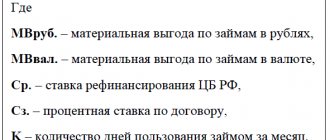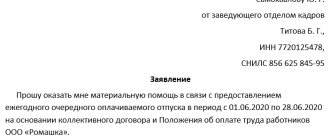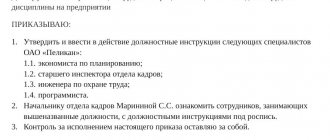An agreement on collective liability allows you to protect the interests of the employer. But it can be concluded only with those employees who perform work included in the “List of positions and work replaced or performed by employees with whom the employer can enter into written agreements on full individual or collective (team) financial responsibility for shortages of entrusted property,” approved Resolution of the Ministry of Labor of Russia dated December 31, 2002 No. 85.
For example, such an agreement can be concluded with a team of warehouse workers, since they perform the work provided for in the specified List: acceptance for storage, processing (manufacturing), storage, accounting, release (issue) of material assets.
The standard form of such an agreement is provided for by Resolution of the Ministry of Labor of Russia dated December 31, 2002 No. 85.
Sample agreement on collective liability 2020, standard form
Order No. 169 of the USSR Ministry of Trade dated August 19, 1982 approved the “Instructions on the procedure for applying in state trade the legislation regulating the financial liability of workers and employees for damage caused to an enterprise, institution, or organization.” According to clause 3.7 of the Instructions, an agreement on full collective brigade financial responsibility cannot be concluded with the following persons:
- with employees of the small retail network (delivery and distribution trade, trade in tents, kiosks, etc., including those located separately in the sales area), as well as other persons with whom an individual agreement on full financial responsibility has been concluded;
- hired on a part-time or part-time basis, if they, together with other employees, do not manage commodity assets (these persons can be sent to independent areas of work with full individual financial responsibility);
- workers of auxiliary professions (ironers, cutters, etc.);
- junior service personnel, loaders, auxiliary (transport) workers, watchmen;
- persons under 18 years of age;
- trainees of educational institutions, students studying directly at trade enterprises;
- graduates of higher and secondary specialized educational institutions and vocational education institutions who do not have experience working with material assets, as well as persons who have undergone industrial training during the first year of work. These employees are prohibited from entrusting independent work on servicing material assets outside the enterprise (delivery and distribution trade, trade in tents, stalls, etc.).
IMPORTANT!
The guidelines continue to apply to this day, but the order in which they will be applied has not been determined. In this regard, this document can be used as a recommendation, since the mandatory nature of its norms is not established by the Labor Code of the Russian Federation or other Federal laws.
However, this regulatory act contains important clarifications that are not reflected in the current legislation. So, for example, according to clause 2.6 of the Guidelines, group responsibility for valuables located on the sales floor (in production) and in the utility room can be established if:
- the utility room is used by only one group, all its members have free access to material assets located both in the sales area and in the utility room, and participate in all trade, warehouse and production operations;
- all commodity operations of production, auxiliary warehouse premises, commodity-money transactions of the trading floor constitute a single process of the group’s work and are controlled by all its participants.
The employer can use these provisions when organizing the safety of property entrusted to the team.
Sample collective liability agreement for a store
When is a collective financial responsibility agreement needed?
In accordance with Article 244 of the Labor Code of the Russian Federation, an employer can enter into financial liability agreements with employees in cases where it is impossible to differentiate the responsibility of each employee for causing harm.
Agreements on full collective (team) financial responsibility can be concluded only with those employees who perform work included in the List of Positions and Works, approved by Resolution of the Ministry of Labor of Russia dated December 31, 2002 No. 85.
Such an agreement can be concluded, for example, with a team of warehouse workers, since they perform the work provided for in the specified List, namely: acceptance for storage, processing (manufacturing), storage, accounting, release (issuance) of material assets. However, remember that you cannot prepare a sample agreement on collective financial liability of the seller; in this case, you will need an agreement on individual financial liability.
Answers to common questions
Question: Does the team leader have more responsibility than other members?
Answer: No, the leader of a team or team bears financial responsibility on an equal basis with other members of the group (39 Labor Code of the Russian Federation).
Question: In the event of the dismissal of one team member, is it necessary to terminate the collective liability agreement and enter into a new one?
Answer: No, there is no need to terminate and conclude a new contract. When an employee is dismissed, the date of dismissal is indicated next to his signature.
Who can you enter into an agreement with?
Order of the USSR Ministry of Trade dated August 19, 1982 No. 169 approved “Instructions on the procedure for applying in state trade the legislation regulating the financial liability of workers and employees for damage caused to an enterprise, institution, or organization.” According to clause 3.7 of the Guidelines, agreements on full collective responsibility cannot be concluded with the following persons:
- employees of a small retail network (delivery and distribution trade, trade in tents, kiosks, etc., including those located separately in the sales area), as well as with other persons with whom an individual agreement on full responsibility has been concluded;
- persons hired on a part-time or part-time basis, if they, together with other employees, do not manage commodity assets (these persons can be sent to independent areas of work with full individual financial responsibility);
- workers of auxiliary professions (ironers, cutters, etc.);
- junior service personnel, loaders, auxiliary (transport) workers, watchmen;
- persons under 18 years of age;
- trainees of educational institutions, students studying directly at trade enterprises;
- graduates of higher and secondary specialized educational institutions and vocational education institutions who do not have experience working with material assets, as well as persons who have undergone industrial training during the first year of work. These employees are prohibited from entrusting independent work on servicing material assets outside the enterprise (delivery and distribution trade, trade in tents, stalls, etc.).
IMPORTANT!
The guidelines continue to apply to this day, but the order in which they will be applied has not been determined. In this regard, this document can be used as a recommendation, since the mandatory nature of its norms is not established by the Labor Code of the Russian Federation or other federal laws.
However, this regulatory act contains important clarifications that are not reflected in the current legislation. So, for example, according to clause 2.6 of the Instructions, the financial responsibility of the team for valuables located on the sales floor (in production) and in the utility room can be established if:
- the utility room is used by only one group of workers, all of them have free access to material assets located both in the sales area and in the utility room, and participate in all trade, warehouse and production operations;
- all commodity operations of production, auxiliary warehouse premises, commodity-money transactions of the trading floor constitute a single work process and are controlled by all its members.
The employer can use these provisions when organizing the safety of property entrusted to the team.
Who can be the financially responsible person?
An employer may enter into individual agreements on full financial liability only with employees of certain categories.
The list of positions and work replaced or performed by employees with whom the employer can enter into written agreements on full individual financial liability for shortages of entrusted property (hereinafter referred to as the List) was approved by Resolution of the Ministry of Labor of Russia dated December 31, 2002 N 85.
The list consists of two sections.
The first contains positions that provide for the conclusion of individual contracts on full financial responsibility with the employees replacing them.
In particular, these are cashiers, controllers, cashier-controllers (including senior ones), as well as other employees performing the duties of cashiers (controllers).
The second section lists types of work, the performance of which also allows the employer to conclude individual agreements with employees on full financial responsibility. These, in particular, include the following works: acceptance and payment of all types of payments; for settlements during the sale (sale) of goods, products and services (including not through a cash register, through a cash register, without a cash register through a seller, through a waiter or other person responsible for making payments); servicing vending and cash machines; for the production and storage of all types of tickets, coupons, subscriptions (including subscriptions and food vouchers) and other signs (documents) intended for payments for services.
How to conclude an agreement on collective liability
The employer's decision to establish full collective (team) financial liability is formalized by order or directive. Team members must be familiarized with the document and signed.
Since there is no unified form of the order, the employer has the right to develop it independently. The order (instruction) should reflect the following information:
- on the formation of a team (team);
- on the appointment of its leader;
- on concluding an agreement on full collective material liability.
By the way
| The new Federal Law “On Accounting” dated December 6, 2011 No. 402-FZ does not provide a list of cases when an inventory must be carried out. Let us recall that in the Accounting Law, which was in force previously, such cases of mandatory inventory were directly stipulated. Moreover, according to the new Law, the cases, timing and procedure for conducting an inventory are determined by the employer himself. Thus, formally it turns out that only the employer in each specific case, at his own discretion, decides whether or not to conduct an inventory, for example, when concluding an agreement on full financial liability or when identifying facts of property shortages. But let's not rush to conclusions. The Law mentions cases of mandatory inventory. So, in Art. 11 states that mandatory inventory is established by the legislation of the Russian Federation, federal and industry standards. Such standards have not yet been developed, but there are other regulations that can be consulted. Thus, by order of the Ministry of Finance of Russia dated July 29, 1998 No. 34n, the Regulations on accounting and financial reporting in the Russian Federation were approved. This order has not been canceled, and the specified Regulation is applied to the extent that does not contradict the new Accounting Law. According to clause 27 of the Regulations, an inventory is mandatory, including when changing financially responsible persons and when identifying facts of theft, abuse or damage to property. In addition, even without taking into account legal requirements, conducting an inventory in these cases is mandatory for objective reasons. For example, when appointing a new materially responsible person, inventory is necessary so that it does not later turn out that the employee will be forced to answer for the shortage that occurred before him. Likewise, before making any claims against an employee, you need to make sure that such claims are justified. By the way, in court the employer will have to provide evidence of damage and confirm the fact of a shortage of property. Damage and the size of the shortage can only be confirmed by inventory results. Please note that the results of the inventory will not be taken into account if it was carried out with violations. |
In the Guidelines for the inventory of property and financial obligations (hereinafter referred to as the Guidelines), approved. Order of the Ministry of Finance of Russia dated June 13, 1995 No. 49 established general rules for conducting an inventory and rules for conducting an inventory of certain types of property and financial obligations, in particular when inventorying inventory, inventory of animals and young animals, as well as drawing up comparison sheets for inventory, procedure regulation of inventory differences and registration of inventory results.
According to clause 10 of the standard form of an agreement on full collective (team) financial liability:
- Planned inventories of property entrusted to the team (team) are carried out within the time limits established by the current rules;
- Unscheduled inventories are carried out when there is a change in the team leader (foreman), when more than 50% of its members leave the team (team), as well as at the request of one or more members of the team (team).
Thus, both when forming a team and when adding a new employee to the team, it is necessary to carry out an inventory of the entrusted property. Failure by the employer to comply with these requirements excludes the possibility of holding the employee (employees) liable for the shortage.
The LLC filed a claim in court against F. for compensation for damage caused by the shortage, since she refused voluntary compensation. Other members of the brigade compensated for the damage. The fact of the shortage was confirmed in court by the results of the inventory. In justifying the demand, the employer referred to the provision in the agreement on collective financial responsibility regarding F.’s consent to join the team without conducting an inventory, since she trusts the team members.
In rejecting the claim, the court recognized that the defendant joined the team without conducting an inventory of goods, so she cannot bear full financial responsibility on an equal basis with other members of the team. Her written consent to join the team without conducting an inventory does not relieve the employer of the obligation to conduct it.
The procedure for collecting damages under a collective liability agreement
If damage is identified that is subject to compensation by the team, the employer is obliged to:
- Document the amount of damage.
- Request an explanation from all team members regarding the existence of damage.
- Establish a cause-and-effect relationship between damage and the performance/non-performance of job duties by employees.
Damage to be compensated by the team is distributed among team members in proportion to the monthly tariff rate (official salary) and the time actually worked for the period from the last inventory to the day the damage was discovered (clause 7.3 of the Instructions). Judicial practice recognizes this method of calculating damages as logical and lawful (clause 14 of the Resolution of the Plenum of the Supreme Court of the Russian Federation of November 16, 2006 No. 52, Determination of the Moscow City Court of June 29, 2010 in case No. 33-16601).
IMPORTANT!
It should be taken into account that, according to Part 4 of Art. 245 of the Labor Code of the Russian Federation, the degree of guilt of each team member is determined by agreement between all members of the team and the employer. Therefore, the employer must draw up an agreement with the employees, which will specify the amount of compensation for each of them.
The very amount of damage to be paid by a specific employee, in accordance with clause 7.3 of the Instructions, can be determined using the following formula:
Р1= С x З1/ (З1+ З2+…+ Зn),
Where:
- P1 - the amount of compensation for damage by the first member of the team;
- C - amount of damage;
- Z1, Z2, Z3, ... Zn - wages of team members for the inter-inventory period based on salaries taking into account the time worked.
When calculating the amount of damages, wages do not include bonuses received by team members, as well as severance pay, compensation and other payments, which, according to the law, are not subject to recovery.
Accordingly, after determining the amount of compensation for damage, a written agreement is drawn up on the amount and procedure for its repayment. The agreement is drawn up by all team members and signed by them and the employer.
If damage is recovered in court, the degree of guilt of each member (of the team) is determined by the court (Part 4 of Article 245 of the Labor Code of the Russian Federation).
Current legislation does not provide for joint liability of employees with whom an agreement on collective financial liability has been concluded in case of harm to the employer.
How to draw up an agreement with a storekeeper?
To draw up a full financial liability agreement with a storekeeper, use the standard form contained in Appendix No. 2 of the Resolution of the Ministry of Labor No. 85. It includes the following sections:
- a preamble indicating information about the employer and the person who is responsible for the inventory;
- responsibilities of the storekeeper, for example, caring for the goods, taking measures to ensure their safety and prevent damage, keeping records of inventory items, participating in inventory, etc.;
- management responsibilities, which include: creating suitable conditions for work and ensuring the safety of property, familiarizing the worker with the content of the agreement establishing financial responsibility, as well as regulations governing work with entrusted property, organizing an inventory, in which actual property is compared with accounting information;







